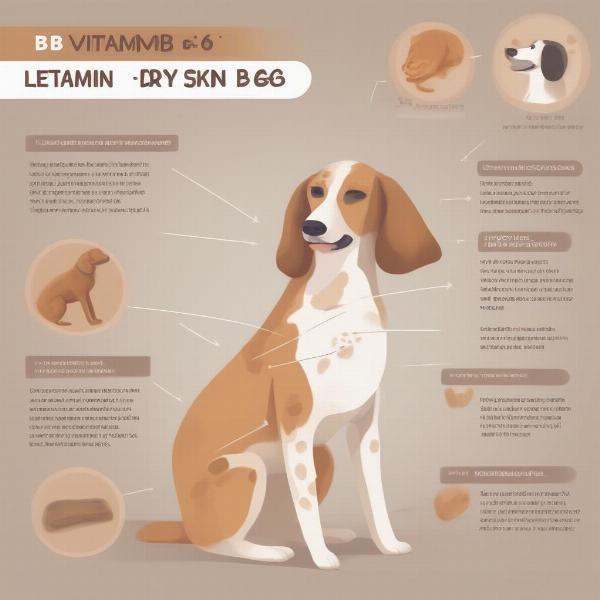Pyridoxine hydrochloride, more commonly known as vitamin B6, is a crucial nutrient for dogs, playing a vital role in numerous bodily functions. Understanding its importance in dog food can help you make informed decisions about your furry friend’s diet and ensure their overall health and well-being. This article will delve into the benefits of pyridoxine hydrochloride, how much your dog needs, potential deficiency symptoms, and what to look for in dog food labels.
Why is Pyridoxine Hydrochloride Important for Dogs?
Vitamin B6 is essential for a dog’s healthy development and maintenance. It plays a critical role in brain development, cognitive function, and red blood cell formation. It also contributes to a healthy immune system, hormone regulation, and the metabolism of carbohydrates, fats, and proteins, which provides your dog with energy. Without adequate pyridoxine hydrochloride, a dog can experience a range of health problems.
How Much Pyridoxine Hydrochloride Does My Dog Need?
The amount of pyridoxine hydrochloride a dog requires depends on factors such as age, size, breed, and activity level. Generally, adult dogs need approximately 0.022 mg of vitamin B6 per pound of body weight daily. Puppies and pregnant or lactating dogs may require slightly higher amounts. It’s best to consult your veterinarian to determine the precise amount of pyridoxine hydrochloride that’s right for your dog. They can assess your dog’s individual needs and recommend appropriate dietary adjustments.
What are the Signs of Pyridoxine Hydrochloride Deficiency in Dogs?
While pyridoxine hydrochloride deficiency is relatively rare in dogs fed commercially prepared dog food, it can still occur, especially if the dog is on a poorly balanced homemade diet. Signs of deficiency can include weakness, lethargy, seizures, skin problems, and a weakened immune system. If you suspect your dog might be deficient in vitamin B6, consult your veterinarian for diagnosis and treatment.
 Symptoms of Pyridoxine Hydrochloride Deficiency in Dogs
Symptoms of Pyridoxine Hydrochloride Deficiency in Dogs
Choosing Dog Food with Pyridoxine Hydrochloride
When choosing dog food, check the label for “pyridoxine hydrochloride” or “vitamin B6.” High-quality dog foods typically contain sufficient amounts of this essential nutrient. Look for foods that meet the Association of American Feed Control Officials (AAFCO) standards for complete and balanced nutrition. These standards ensure the food provides all the essential nutrients a dog needs in the correct proportions.
What Foods are Rich in Pyridoxine Hydrochloride?
While commercial dog food often provides adequate amounts of vitamin B6, you can also supplement your dog’s diet with natural sources. Foods rich in pyridoxine hydrochloride include chicken, fish, beef liver, bananas, and spinach. However, always consult your veterinarian before adding any supplements or significant dietary changes to your dog’s routine, as too much vitamin B6 can be harmful.
Conclusion
Pyridoxine hydrochloride is a vital nutrient for dogs, contributing to their overall health and well-being. Ensuring your dog receives the correct amount of vitamin B6 through a balanced diet is crucial for their growth, development, and long-term health. By understanding the importance of pyridoxine hydrochloride and choosing appropriate dog food, you can help your canine companion thrive.
FAQ
-
What is the difference between pyridoxine hydrochloride and vitamin B6? Pyridoxine hydrochloride is a specific form of vitamin B6 that is commonly used in dog food.
-
Can I give my dog human vitamin B6 supplements? No, it’s not recommended to give your dog human vitamin B6 supplements without consulting your veterinarian. Dosage and formulation can differ, and human supplements may contain ingredients that are toxic to dogs.
-
How do I know if my dog is getting enough pyridoxine hydrochloride? The best way to determine if your dog is getting enough vitamin B6 is to consult your veterinarian. They can assess your dog’s diet and conduct necessary tests if a deficiency is suspected.
-
What happens if a dog gets too much pyridoxine hydrochloride? Excessive vitamin B6 can lead to nerve damage and other health issues in dogs. Always follow your veterinarian’s recommendations regarding dosage.
-
Are there any dog breeds more prone to vitamin B6 deficiency? Certain breeds like Beagles, Giant Schnauzers, and Alaskan Malamutes may have a higher risk of vitamin B6 deficiency.
-
Can a vitamin B6 deficiency be reversed? In most cases, vitamin B6 deficiency can be reversed with appropriate supplementation and dietary adjustments under the guidance of a veterinarian.
-
Are there any interactions between pyridoxine hydrochloride and other medications? Yes, vitamin B6 can interact with certain medications. Always inform your veterinarian about any medications your dog is currently taking.
ILM Dog is your trusted resource for expert advice on dog care, breed information, health and wellness, training, nutrition, and much more. We provide comprehensive information to empower dog owners worldwide with the knowledge and resources they need to nurture the special bond with their canine companions. From puppyhood to senior years, we cover every aspect of responsible dog ownership. For tailored advice and support, contact us at [email protected] or call +44 20-3965-8624. ILM Dog is committed to helping you provide the best possible care for your beloved furry friend.